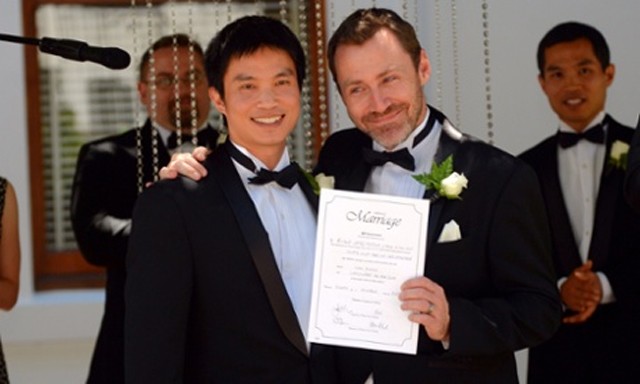Marriage Equality director Ivan Hinton and Chris Teoh display their marriage certificate in Canberra.
It is deeply disappointing that the Australian Capital Territory’s Marriage Equality Act has been struck down, but don’t let that dark cloud obscure some very bright silver linings.
I was more upset than I expected when the high court announced it has overturned the ACT’s Marriage Equality Act. I was lucky enough to attend the weddings of friends in Canberra in the preceding days, and was deeply moved to see the reform I have advocated for for over decade come to life before me.
After the court’s decision, what kept me from breaking up in front of the TV cameras was the courage of the married couples themselves. Despite having just had their marriage certificates turned into little more than souvenirs, the couples were philosophical about the decision.
“We are still married in our hearts”, one couple said. They are true Australian heroes. And they have every reason to be hopeful for the future.
The high court’s decision affirmed for the first time that the federal parliament has the power to enact same-sex marriage laws. Most people already assume it has this power. But there was always a possibility the court could declare the federal parliament’s power was limited to the one man/one woman definition of marriage current when the federal constitution was adopted in 1901. Instead, the court agreed that the parameters of marriage can change over time, as they have on numerous occasions in Australian history.
With the removal of the question mark that hung over the federal parliament’s power, there is one less barrier to marriage equality at a national level. This increases pressure on federal parliament to act.
We have already seen the formation of a cross-party working group that includes members of the Green, Labor and Liberal parties. This will take the politics out of the issue and ensure supporters of reform across the parliament work together in the same way they have in the UK and New Zealand to give marriage equality the best chance possible.
At a federal level, the next step is for Tony Abbott and the Coalition to allow a conscience vote so that Coalition MPs who were elected as reform supporters have an opportunity to vote for it. I am hopeful we will see this in 2014.
The court’s decision also leaves the way open for the states and territories to pass alternative legislation for same-sex marriages. The ACT government chose the constitutionally risky path of drawing on the definition of marriage in the federal Marriage Act in its own marriage equality law, despite expert warnings. In states like Tasmania, NSW and Western Australia, pro-reform MPs have chosen the safer path of legislating for a distinct new legal status of same-sex marriage. The court’s decision does not preclude these differently framed laws from being enacted.
In the words of Australia’s most eminent constitutional academic, George Williams, “the high court has not considered the position of any differently drafted state or territory law. It remains open to argue that such a law might not be inconsistent with the Federal Marriage Act.”
Expect to see continued debate on same-sex marriage at a state and territory level. Beyond these outcomes, there’s an even more important reason for marriage equality supporters not to be deflated by the high court decision. The images and personal stories that emerged from this week’s same-sex marriages in Canberra took Australia’s understanding of marriage equality to a new level.
The public has seen that this issue is not, at its core, about protests, politics, laws and constitutions. It has seen that allowing same-sex couples to marry is about love, commitment, family and fairness, values we all share. It has seen that same-sex marriages pose no threat to society or to marriage, and that the sky does not fall in when two men or two women walk down the aisle together. It has seen that the stereotypes that still underpin opposition to marriage equality – stereotypes about same-sex relationships being unstable, short lived and entirely sexual – have no basis in reality.
Most of all, Australia has seen that marriage equality isn’t just an issue for other countries or future times, but that it affects ordinary Australian families right here, right now. The great joy and sheer normality of the marriages that the nation has witnessed marks a turning point in the Australian marriage equality debate from which there is no going back.
Photo: Alan Porritt
Author: Rodney Croome
Publication: theguardian
Date: 13 December 2013
Original article here

